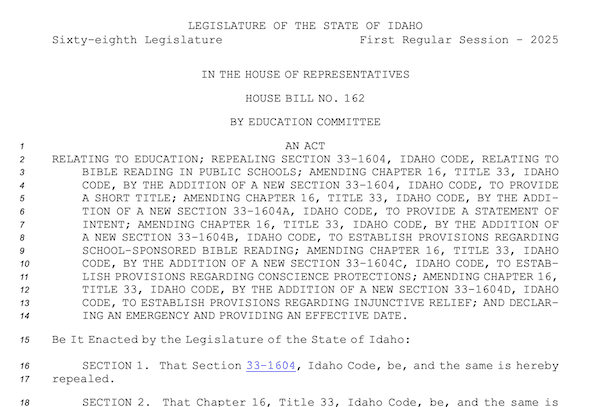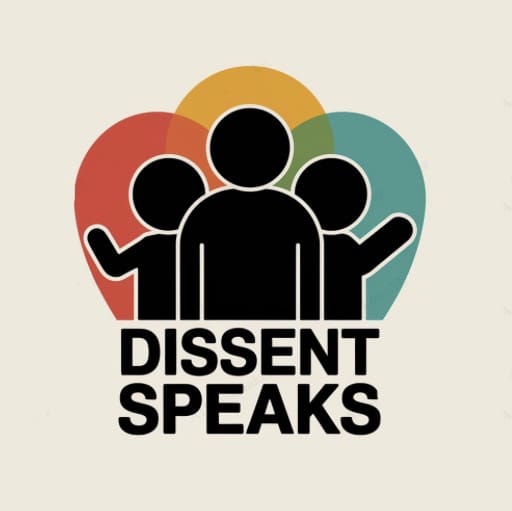House Bill 162, introduced in Idaho’s 68th Legislature, mandates daily Bible readings in all public school classrooms. This analysis examines the bill’s implications, constitutional questions, and potential societal impact through an investigative lens.
The Legislation’s Core Elements
The bill requires daily readings from specific versions of the Bible (King James, New King James, or Revised Standard) in every public school classroom, without commentary or interpretation. Schools must complete the entire Bible sequentially over ten years, with provisions for conscientious objections from teachers and students.
Critical Questions of Timing and Intent
The bill’s emergency declaration for implementation by July 1, 2025, raises important questions about urgency. The timing coincides with significant shifts in establishment clause jurisprudence, particularly following the Supreme Court’s Kennedy v. Bremerton School District (2022) decision. This strategic timing suggests an attempt to capitalize on evolving legal interpretations.
Constitutional Considerations and Legal Strategy
The legislation explicitly challenges established precedent, particularly Abington School District v. Schempp (1963) and Adams v. Engelking (1964). The bill’s authors argue that recent Supreme Court decisions, especially Kennedy v. Bremerton, support their position by emphasizing historical practices over the previously dominant Lemon test.
However, this interpretation raises several concerns:
- The bill assumes that historical practice alone justifies contemporary policy, potentially overlooking evolving societal needs and constitutional interpretations.
- While providing conscience protections, the mandatory nature of the program still presents significant establishment clause concerns.
- The designation of specific Bible versions may constitute governmental preference for particular religious interpretations.
Language Analysis and Rhetorical Strategy
The bill’s language reveals careful political positioning. It characterizes the Bible as “nonsectarian” and “the most important book in the world,” presenting these assertions as factual rather than theological claims. This framing attempts to circumvent establishment clause concerns by positioning Bible reading as cultural rather than religious practice.
Societal Impact and Public Interest
Educational Implications
The mandate raises significant questions about educational autonomy and religious pluralism in public schools. The requirement to refer all student questions to parents or guardians may impede natural classroom discourse and critical thinking.
Community Effects
The legislation could significantly impact Idaho’s increasingly diverse communities. While conscience protections exist, the default position of mandatory Bible reading may create social and cultural pressures, particularly for religious minorities and secular families.
Hidden Costs and Implementation Challenges
The bill presents several practical challenges:
- Administrative burden on schools to organize and maintain ten-year reading schedules
- Potential costs of providing alternative supervision for opted-out students
- Risk of litigation and associated legal expenses
- Impact on classroom time allocation and curriculum planning
Beneficiaries and Stakeholders
Primary beneficiaries appear to be religious conservative constituencies seeking greater religious presence in public education. However, this comes at potential cost to:
- Religious minorities and secular families
- Educators concerned about professional autonomy
- School districts facing implementation challenges
- Taxpayers potentially bearing costs of legal challenges
Public Interest Assessment
While proponents argue this legislation promotes moral education and civic virtue, several factors suggest it may not serve the broader public interest:
- It potentially alienates significant portions of the community
- Creates administrative burdens for schools
- Risks costly legal challenges
- May detract from core educational objectives
Conclusions and Implications
House Bill 162 represents a significant shift in church-state relations within public education. While framed as a return to historical practice, it raises substantial constitutional, practical, and social concerns. The emergency declaration and strategic timing suggest political calculation rather than educational necessity.
The legislation’s impact extends beyond simple Bible reading, potentially affecting community cohesion, educational effectiveness, and religious freedom. While providing conscience protections, the bill’s underlying assumption that Bible reading should be the default position in public schools challenges fundamental principles of religious neutrality in government institutions.
This analysis suggests the need for broader public discourse about religious expression in public schools and careful consideration of how such policies affect increasingly diverse communities. The bill’s passage could set precedents affecting similar legislation in other states, making it a matter of national significance.


